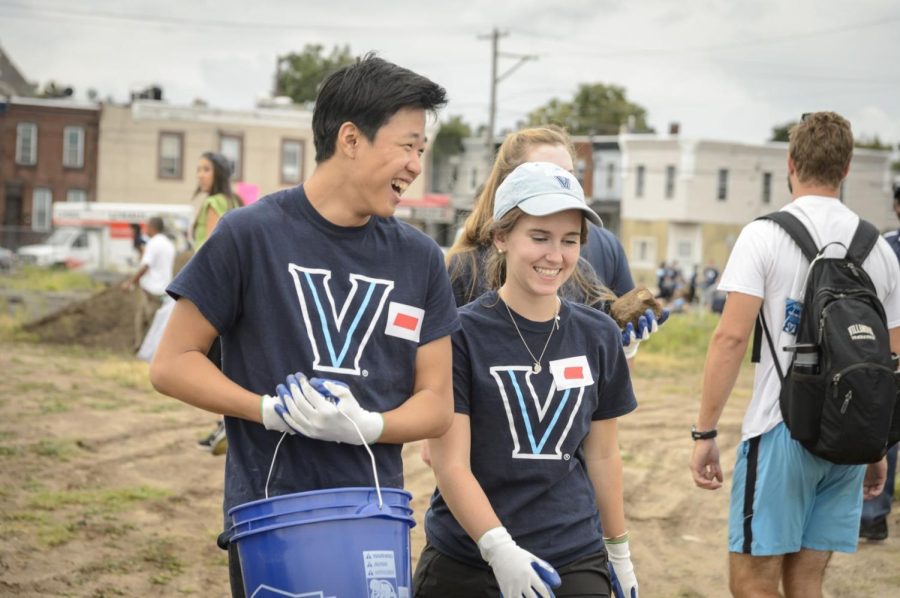Our campus culture thrives on the highly involved
March 8, 2016
My typical day includes two to four classes, two group meetings, at least one extracurricular activity meeting and anywhere from two to five hours of homework. My phone calendar is filled to the brim with entries, all of them carefully color-coded. I live and die by the reminders app, and my Groupme account never reaches zero unread messages. I am insanely busy, but what’s even more alarming is that, by Villanova standards, my level of involvement is fairly average. This campus is filled with people even busier than I am, and we all seem to equate being busy with being successful. Getting another leadership role for the resume, another group chat, another quarter zip is encouraged more so than discerning whether or not you actually want a particular position. We operate on an “apply first, think later” paradigm. Our campus culture applauds the highly involved instead of the highly fulfilled.
Chances are that you have heard of the “Big Four” clubs. The definition of how many “Big” clubs there are, and which ones qualify, changes depending on whom you ask, but the overriding theme is that some organizations on campus dominate the landscape. These are the groups that rake in hundreds of applications every year and boast membership rosters in the triple digits. The recruitment process for these massive clubs is a perennial source of angst for both new students and upperclassmen. Essay questions and multiple rounds of interviews are usually required for positions that are supposed to be fun volunteer roles. When the process is finally over, more students are denied membership than are accepted, and some students are offered membership in several large organizations when others are accepted by none.
This problem will only become more apparent as the average class size continues to grow. The University is breaking records in applications as well as enrollment. With several organizations already at capacity, it is clear that more and more new students are going to feel alienated when they don’t find a place in the “Big Four.” Think back to your first semester here at the University. So many of my friends and relatives had warned me that the time will fly by and that I should “make the most of it.” Not quite knowing what that meant, I tried to fill up my schedule to the absolute maximum. I signed up for about a dozen clubs at the activities fair, applied to about half of them and found myself enrolled in four or five organizations at once by the spring.
Returning to campus for sophomore year, I did leave some organizations I didn’t really feel passionate about, but I adjusted for the free time by gaining leadership roles in the organizations I stuck with. As academic intensity ratcheted up, my schedule grew tighter and tighter. But, in a weird way, I actually enjoyed jam-packed days. I was definitely making the most of every second, and being in charge of things gave me a sense of success and importance. It is only at semester breaks that I step back and realize just how absurd my life on campus really is. I know that I’m not alone in using a busy schedule as a yardstick for success, and this campus thrives on highly involved, high-achieving students. I’ve concluded that a large portion of the campus, myself included, is addicted to being busy, and in the end it might end up causing more harm than good.
The first step is admitting we have a problem. I am not trying to diminish any of the larger clubs on campus, and they all serve a very important purpose in the campus culture. Sometimes a large roster is necessary to accomplish a particular group’s mission However, it is time that we as a campus—students and administration-—take a hard look at our motivations regarding campus involvement. Are we joining organizations because we are passionate about their missions or because we want to put another thing on our resumes and schedules? Are we joining for the perceived status the organization has? Does the University support certain groups primarily because it helps its image? It’s time that student leaders and administration leaders alike retool recruitment so that the status perception does not influence where any given student devotes their time and energy.
It is also important to realize that being busy does not mean that you are special or important. As hard as that is to grasp, filling your schedule just for the sake of feeling important isn’t the way to go. For some, burying oneself in academic work or extracurricular involvement is just a way to ignore other issues in one’s life, and for others, membership in certain organizations is a measure of status. Let’s stop idolizing the busy, involved, quarter-zip clad “Nationers” and instead promote involvement based on interest and passion. As this campus grows, so should smaller groups that have just as much to offer their members as the “Big Four.” The membership and status imbalance has to end. Rejection from a “Big Four” group doesn’t spell an end to your Villanova extracurricular life- instead, take your talents to a smaller group in which you have a genuine interest. Villanova has a responsibility to break down the hype surrounding certain groups, especially for new students, and make sure Villanovans get involved in something because they care about it, not because of the perceived status bump that comes with it.










